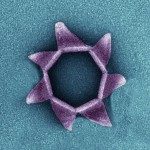Lien vers Pubmed [PMID] – 21569059
FEMS Microbiol. Rev. 2011 Nov;35(6):1035-54
Since their discovery in the early 1980s, viruses that infect the third domain of life, the Archaea, have captivated our attention because of their virions’ unusual morphologies and proteins, which lack homologues in extant databases. Moreover, the life cycles of these viruses have unusual features, as revealed by the recent discovery of a novel virus egress mechanism that involves the formation of specific pyramidal structures on the host cell surface. The available data elucidate the particular nature of the archaeal virosphere and shed light on questions concerning the origin and evolution of viruses and cells. In this review, we summarize the current knowledge of archeoviruses, their interaction with hosts and plasmids and their role in the evolution of life.
